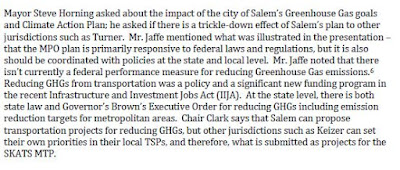This week a group of 14 jurisdictions, including the City of Keizer and Marion County, two members of the eight that set transportation funding and policy at our Metropolitan Planning Organization, SKATS, filed suit against the Climate Friendly and Equitable Communities rules the State adopted earlier this year.
 |
| Suit against the CFEC rule-making |
See Willamette Week and OPB for more:
- "Fourteen Local Governments Sue State to Block Implementation of Governor’s Executive Order on Climate" (Willamette Week)
- "A group of Oregon cities are planning to sue the state over wide-ranging climate rules" (OPB)
At the May meeting of SKATS earlier this year, Keizer Mayor Clark echoed several themes in the lawsuit, saying "Keizer can set their own priorities," a little bit of "don't tell me what to do" spirit.
 |
| May SKATS PC meeting |
But what Keizer wants is for the MPO (and the State) to adopt its looser priorities and values so it can still get funding for bad projects. This penalizes Salem, however, and other jurisdictions that might want funding for good projects which do not conform to older autoist standards. (Not to mention the penalty to the commons, to all of us indirectly harmed by Keizer's recalcitrance.) Marion County has said similar things, with even more explicit climate denialism.
So we've seen the arguments before, often on social media. From the suit:[U]nintended negative consequences will arise. For example, by forcing development into the centers of cities and making it more difficult to develop transportation systems on the edges of cities, the CFEC Rules will, in some circumstances, encourage homes to be built in nearby bedroom communities with less stringent CFEC requirements, again increasing reliance on automobiles as commute lengths grow. Similarly, broad prescriptive brushes—such as strictly limiting parking requirements—may work in some communities but will backfire in others. Many cities currently have parking shortages. Prohibiting local governments from mandating adequate levels of parking will create safety risks and have inequitable results as parking becomes increasingly hard to find, particularly for lower-income individuals living in multifamily dwellings. Exacerbating parking crises will make it harder for these communities to cultivate safe residential environments and will also make it more difficult to attract economic development—particularly from businesses that rely on having readily available parking for customers and employees.
These concerns are especially acute in the many communities that do not currently have adequate or reliable public transportation, but which provide more affordable housing than cities, like Portland, that have more robust transit infrastructure. In many communities, heavy reliance on public transportation is not yet a viable option and the mandates in the CFEC Rules merely create new problems without solving the targeted ones. This is particularly true given that the Rules place no obligations on transit authorities to provide additional services, leaving cities stuck relying on nonexistent or inadequate services whose development they cannot control.
There will certainly be more to say.
Previously see:
- "New State Climate Rules on Transportation and Land Use look for Adoption this Week" (May)
- "Story on Climate Friendly Rules Misses Mark" (May)
- "City Council, July 25th - Our Salem and new Climate-Friendly Rules"
As others comment, we'll update here or post separately as seems useful. When briefs with the argument in support of the new rules are published, they also may yield updates here or posts separately.
On FB, a person already claimed that Salem City Staff reported "the parking spaces in
affordable housing units are severely underutilized something like 50%
occupancy." This is consistent with the fact that cars are expensive to own and operate, and poor people often do not have them. There are better ways to support the transportation needs of those for whom a car is a financial penalty. This claim of 50% utilization will be interesting to confirm and see when the City presumably includes the data in a Staff Report some time.
And to echo the note on this week's formal Work Session, we will look for empirical data in preference to mood and sentiment. People fear the loss of parking, but many of the fears are not grounded in reality or have substantially different kinds of outcomes in reality.


No comments:
Post a Comment